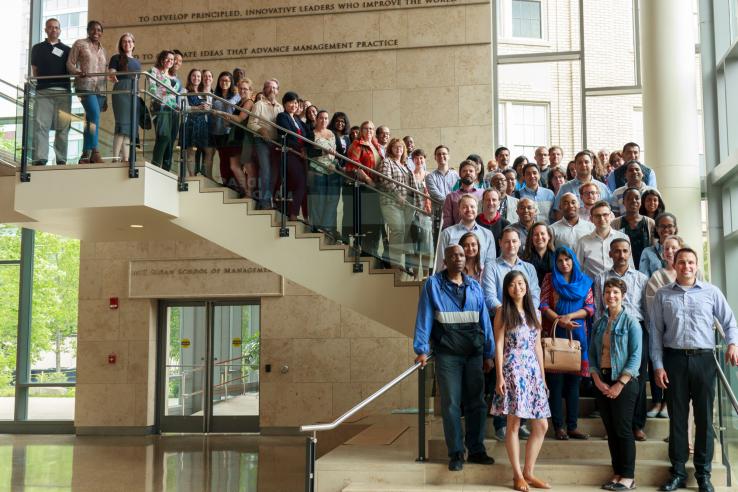J-PAL Executive Education: Evaluating Social Programs, US 2018

Program Objectives
This five-day in-person training gives participants a thorough understanding of why and when researchers and policymakers might choose to conduct randomized evaluations and how randomized evaluations are designed in real-world settings. The course covers basic concepts related to measuring impact through randomized evaluations and discusses technical design choices as well as pragmatic considerations when conducting a randomized study. It reviews the benefits and methods of randomization, how to choose an appropriate sample size, and common threats and pitfalls to the validity of an experiment. It also covers the importance of a needs assessment and a theory of change, and how to measure outcomes effectively—tools that are critical for all program evaluations.
Program Focus
The following key questions and concepts are covered:
- What is an evaluation?
- Why and when is a rigorous evaluation of social impact needed?
- The common pitfalls of evaluations and how randomization helps avoid them.
- The key components of a good randomized evaluation design.
- Alternative techniques for incorporating randomization into project design.
- How do you determine the appropriate sample size, measure outcomes, and manage data?
- Guarding against threats that may undermine the integrity of the results.
- Techniques for the analysis and interpretation of results.
- How to maximize policy impact and test external validity.
- Understanding and using the Theory of Change framework.
Target Audience
The course is designed for directors, managers, officers, and researchers from governments, NGOs/nonprofits, international development organizations, and foundations, as well as trained economists looking to retool.
Former participants say:
“Great opportunity to design and receive feedback on our own evaluations.”
“Really enjoyed the teaching methods. The initial exposure to case studies was then solidified through lectures and small group work. The constant interaction kept students engaged throughout.”
“I enjoyed this training very much and thought the experience was excellent. I still am buzzing whenever I speak about it. There were many wonderful aspects: the working groups, the quality of the other students, the quality of the TAs and the seriousness and dedication of the training effort. It was absolutely first-class.”
Key Information
| Dates: | 11 – 15 June 2018 |
| Location: | Massachusetts Institute of Technology Cambridge, MA United States |
| Contact: | Tom Bangura, [email protected] |
The April 15th application deadline for this course is now closed. Moving forward, only privately sponsored applications are welcomed to fill their application form here.
You can view the fee structure for the course. The fee includes breakfast, lunch, beverages, and snacks, as well as a group dinner. It does not include travel or accommodation.
Lecture Slides
Lecture 1: What is Evaluation
Laura Feeney, Associate Director of Research at J-PAL North America
Presentation Slides
Lecture 2: Measurement: Outcomes, Impact, and Indicators
Anja Sautmann, Director of Research, Education, and Training at J-PAL Global
Presentation Slides
Lecture 3: Why Randomize
Dan Levy, Senior Lecturer in Public Policy, Harvard Kennedy School of Government
Presentation Slides
Lecture 4: How to Randomize
William Parienté, Assistant Professor, Université Catholique de Louvain
Presentation Slides
The RCT Experience, from a Practitioner's Perspective: Nurse-Family Partnership in South Carolina
Christian Soura, Vice President of Policy and Finance at the South Carolina Hospital Association
Presentation Slides
Lecture 5: Sampling and Sample Size
Shawn Cole, John G. McLean Professor of Business Administration, Harvard Business School
Presentation Slides
Lecture 6: Threats and Analysis
Maggie McConnell, Assistant Professor of Global Health Economics at Harvard School of Public Health
Presentation Slides
Lecture 7: Start to Finish
Judd Kessler, Assistant Professor of Business Economics and Public Policy, The Wharton School, University of Pennsylvania
Presentation Slides
Lecture 8: Generalizability
Mary Ann Bates, Executive Director at J-PAL North America
Presentation Slides